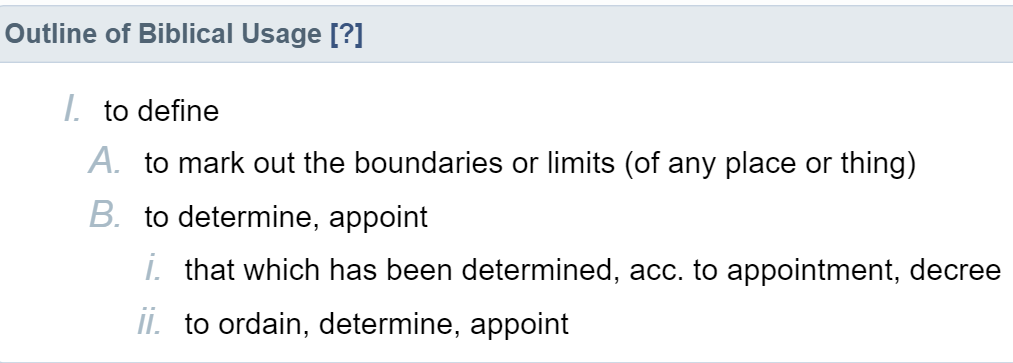|
“And looking intently at the council, Paul said, ‘Brothers, I have lived my life before God in all good conscience up to this day'”
(Acts 23:1)
This article will dissect three words from Acts 23:1 in an attempt to answer the question of “what does it mean to have a ‘good conscience’ before God?” This is an incredibly important topic that carries profound benefits for the Believer. My prayer for you is that you find freedom from guilt and shame, peace of mind, and greater joys in your relationship with God.
|
|
|
The exhortation to walk in a “manner worthy of God” is founded upon the fact of a deserving God. He deserves all glory and honor and praise. He alone is worthy to be glorified! This is what we were created for; we were created to serve Him and bring God glory. When we fall short of bringing Him the glory He is due, we rob ourselves of our divinely crafted purpose, and we rob God of the glory of which He is worthy. When we can, like our Brother Paul, say that we are trying our best to be obedient, we can rest in the refreshing streams of a good conscience before God. …
If we could ask Jesus what our obedience should look like, he would likely respond with “service and sacrifice.” 1) love-based service – serving God, the Body of Christ, and the dying world with the life-giving love of Jesus. 2) love-based sacrifice – sacrificially giving ourselves for the benefit of others.
- Matt. 22: 37-39, “And he said to him, “You shall love the Lord your God with all your heart and with all your soul and with all your mind. This is the great and first commandment. And a second is like it: You shall love your neighbor as yourself.”
- Gal. 5:14, “For the whole law is fulfilled in one word: “You shall love your neighbor as yourself.”
- James 2:8, “If you really fulfill the royal law according to the Scripture, “You shall love your neighbor as yourself,” you are doing well.”
- Luke 6:27-29, “But I say to you who hear, love your enemies, do good to those who hate you, 28 bless those who curse you, pray for those who abuse you.29 To one who strikes you on the cheek, offer the other also, and from one who takes away your cloak do not withhold your tunic either.” (love cannot be separated from sacrifice).
- Rom. 12:1, “I appeal to you therefore, brothers, by the mercies of God, to present your bodies as a living sacrifice, holy and acceptable to God, which is your spiritual worship [service].”
- 2 Cor. 5:17-21, “Therefore, if anyone is in Christ, he is a new creation. The old has passed away; behold, the new has come. All this is from God, who through Christ reconciled us to himself and gave us the ministry of reconciliation; that is, in Christ God was reconciling the world to himself, not counting their trespasses against them, and entrusting to us the message of reconciliation. Therefore, we are ambassadors for Christ, God making his appeal through us. We implore you on behalf of Christ, be reconciled to God. For our sake he made him to be sin who knew no sin, so that in him we might become the righteousness of God.”
Lastly, let us look specifically at the Greek word for “lived my life.” This word caught me off-guard. I expected to see the normal, regularly used word for lived (ζάω - zaō; or κατοικέω - katoikeō). But it is not. Instead it is a word that is only found twice in the Bible. God inspired Paul to use the word πολιτεύομαι (politeuomai). This word is only used here and in Phil. 1:27 (“Only let your manner of life be worthy of the gospel of Christ... with one mind striving side by side for the faith of the gospel”). This word is a reference to a “citizen” and it comes from the root word for “city” (πόλις - polis). (Selah...) This is what Blue Letter Bible says of this word: it means “to be a citizen; to administer civil affairs, manage the state; to make or create a citizen; to be a citizen; to behave as a citizen.”
I have to imagine that one of the reasons Paul was able to declare his conscience clear is because he has lived as a citizen of Zion. Paul lived daily knowing where his true home was. He conducted himself as a citizen of heaven, obedient to the call God had placed on him.
- Phil. 3:20-21, “But our citizenship is in heaven, and from it we await a Savior, the Lord Jesus Christ, who will transform our lowly body to be like his glorious body, by the power that enables him even to subject all things to himself.”
May we, like Paul, keep in mind that this is not our home. May we not fall prey to that trap of thinking this is home. “For we know that if the tent that is our earthly home is destroyed, we have a building from God, a house not made with hands, eternal in the heavens. For in this tent we groan, longing to put on our heavenly dwelling” (2 Cor. 5:1-2).
{Bonus quote} “Now, no man, I think, ever prayed God to grant him partial obedience. Did he ever pray, dare he ever pray, ‘O Lord, help me to overcome some of my sins, but not all. [sic] This day preserve me from some temptations, but allow me to indulge some of my propensities’? Did you ever pray, ‘O Lord, keep me, I pray You, from great and open sins, but permit me, in Your infinite mercy, to enjoy certain private sins that I am exceedingly fond of’? Such a prayer is worthier of a worshipper of the devil than of a worshipper of God. No, our heart renewed by grace craves to be perfectly set free from sin” (Spurgeon).
0 Comments
If the same power that rose Jesus from the dead lives in me, how do I live according to that power?!
"the Spirit of him who raised Jesus from the dead dwells in you, he who raised Christ Jesus[d] from the dead will also give life to your mortal bodies through his Spirit who dwells in you" (Rom. 8:11).
Today, I will be discussing what it means to live according to the resurrection power of God. I am going to attempt to provide 3 very practical answers to this question from Colossians 3:1-4.
There are many important theological precepts tied to Jesus’ resurrection. For example, Roman 1: 3-4 states, “concerning his Son, who was descended from David according to the flesh and was declared to be the Son of God in power according to the Spirit of holiness by his resurrection from the dead, Jesus Christ our Lord” (ESV). This is hugely important. This demonstrates the all-surpassing necessity of the Messiah’s resurrection. First, this shows us that Jesus was declared to be the Son of God by the resurrection. Up to this point in history, there had been a number of people who claimed to be the Messiah (Josephus). But the claims of these false-christs were silenced by their death. There was only one man who claimed to be Messiah, who actually fulfilled all the prophecies and rose from the dead. Only One. Just Jesus. The Resurrection declared God’s approval of Jesus’s identity, His atoning work and sacrifice, and the undying love of God for man!
The resurrection not only declared/communicated God’s approval of Jesus, it was necessary for the perfect fulfillment of Scripture. In the ESV, this is the only time this Greek word (ὁρίζω - horizō) is translated “declared.” All other times, it is used of something (or someone) being appointed or determined:
The resurrection was an essential appointment in Jesus’ life and ministry. Jesus was appointed, before the foundation of the earth was laid, to die a substitutionary death and rise from the dead. God’s plan for salvation was to present humankind a Savior who was both their perfect Atoning Sacrifice and their Immortal King! A Lamb and a Lion. God and man. A servant and a King. A prophet and a priest. Humble and Exalted. Jesus was appointed to both suffer death and defeat it! God promised to cure the sickness of sin through the suffering and death of Messiah (Isaiah 53), and God promised an immortal King through the lineage of David (2 Sam. 7:12-13). One who would rule and reign over God’s people forever. The resurrection was so imperative because it proved Jesus’ immortality and His Divinity. It proved the Kingdom of God had been established, and it was He who sat on the throne.
It is theologically significant in many other ways, also. Today, however, I really want to discuss the practical implications of the Resurrection of Jesus. Specifically, I want to attempt to answer the question, “how do I live my life in accordance with the resurrection power, of the Holy Spirit, within me?!” My goal, this Easter, is to move the information about the power of Christ’s resurrection from the head to the heart.
Relationship (Col. 3:1, “...seek...”)
The short list is this: 1 Peter 1:3, Phil. 3:10, Rom. 6:5, 1 Cor. 15:19-20, Col. 2:12, Col. 3:1-4, 2 Cor. 4:10-11, etc. I encourage you to look them up on your own. What the Bible instructs us through these Passages is that we are to identify with the Power of Christ’s resurrection. And not simply identify, we are to live according to what we have been given – the same life-giving power that rose Jesus from the dead. Entire Passages. Entire songs. Entire sermons. Entire devotionals. Entire blog-posts have dedicated to this precious reality.
From the symbolism of water baptism, which connects the soul to the life-giving work of Jesus. Baptism is a visual sermon about the power of Christ to raise those who were spiritually dead. “having been buried with him in baptism, in which you were also raised with him through faith in the powerful working of God, who raised him from the dead” (Col. 2:12). It is the very image of our Savior’s death and resurrection, as well as a pictorial reminder of the power of God to save and to raise.
From the symbolism of water baptism, which connects the soul to the life-giving work of Jesus. Baptism is a visual sermon about the power of Christ to raise those who were spiritually dead. “having been buried with him in baptism, in which you were also raised with him through faith in the powerful working of God, who raised him from the dead” (Col. 2:12). It is the very image of our Savior’s death and resurrection, as well as a pictorial reminder of the power of God to save and to raise.
To the experiential Covenant relationship of Yahweh with His people. Paul states we are to “know Him and the power of His resurrection” (Phil. 3:10). It is supposed to go beyond simply watching YouTube videos, to actually interacting with the Person, the ministry, and the comfort of the Holy Spirit (2 Cor. 13:14). We are not only to understand that the fullness of God dwells within us by the Person of the Holy Spirit, but we are to actively SEEK Him and we are to earnestly SERVE Him. Col. 1:9-10 declares, “... we have not ceased to pray for you, asking that you may be filled with the knowledge of his will in all spiritual wisdom and understanding, so as to walk in a manner worthy of the Lord, fully pleasing to him: bearing fruit in every good work and increasing in the knowledge of God.” We have entered a highly experiential relationship with God. And it is defined and characterized by the Power of Christ’s resurrection, which was exerted over us and given to us.
It is clear. The Bible did not misrepresent the Heart of God. But the question still remains, “How do I live the raised life? How do I walk according to the resurrection power of God?” The answer is going to surprise you. You can find the answer in Colossians 3:1-4. It begins with Savior Seeking. I mean... How can one know what it means to live the raised life – living by the resurrection power of the Spirit – without looking to the One who raises the Dead?!
On this topic, Colossians 3 opens with the answer of seeking (ζητεῖτε) and setting (φρονεῖτε). “If then you have been raised with Christ, seek the things that are above, where Christ is, seated at the right hand of God. Set your minds on things that are above, not on things that are on earth. For you have died, and your life is hidden with Christ in God. When Christ who is your life appears, then you also will appear with him in glory” (1-4). It begins with setting your mind on the things of God and continuously, regularly, undyingly, zealously, seeking the Lord and His help. The way these words are constructed in the Greek intensify this instruction. Both set and seek are parsed as Present Imperative Active verbs. This means “Continually, habitually follow this command! The Present Imperative is often a call to a long-term commitment and calls for the attitude or action to be one's continual way of life (lifestyle)” (Precept Austin). The first directive to living the raised life, is to set the motivations of your mind and heart on regularly, actively, daily seeking the risen King. This Passage offers step one of living according to the same power that rose Jesus from the dead. It is to set your mind on seeking our Lord.
So what does this mean? Simply and practically, it means creating time for the Lord every day. It is so imperative to develop habits of grace. It is setting aside time for prayer, fasting, worship/service, meditation, reading the Bible, and practicing thankfulness. Making the intentional and conscious efforts to regularly seek the Lord will be the very efforts by which the soul will soar to the heights of relationship with God and experience the resurrection power of Christ. This is so important. This how one can begin to position themselves to live the raised life!
“I know of no better thermometer to your spiritual temperature than this, the measure of the intensity of your prayer” (Spurgeon).
"I am a spiritual being... After this body is dead, my spirit will soar. I refuse to let what will rot rule the eternal. I choose self-control. I will be drunk only by joy. I will be impassioned only by my faith. I will be influenced only by God. I will be taught only by Christ" (Max Lucado).
"Yours will be the wings of an eagle's flight, the soaring of a lark, sunward, heavenward, Godward! But you must take time to be holy - in meditation, in prayer, and especially in the use of the Bible" (F.B. Meyer).
There is, however, another answer to the question of “how do I walk according to the same power that rose Jesus from the dead?”
Rising Above! (Vs. 3, “… you died… hidden…”)
Our Passage brings us to another point. A surprising point! A VERY surprising point!!!
As a good American, I have always been compelled to interpret the answer of living the raised live – living in accordance with the resurrection power within us, by the Holy Spirit – through the Lens of postmodernity. I have ALWAYS thought that living the raised life means rising above discomfort. Rising above dysfunction. Rising above sorrow. I thought it meant to rise up and out of pain. I thought the raised life meant learning to arise and escape suffering. I assumed, because I am a good western-minded American, it meant rising above tribulation and affliction to the zenith of soaring to the heights of comfort.
As a good American, I have always been compelled to interpret the answer of living the raised live – living in accordance with the resurrection power within us, by the Holy Spirit – through the Lens of postmodernity. I have ALWAYS thought that living the raised life means rising above discomfort. Rising above dysfunction. Rising above sorrow. I thought it meant to rise up and out of pain. I thought the raised life meant learning to arise and escape suffering. I assumed, because I am a good western-minded American, it meant rising above tribulation and affliction to the zenith of soaring to the heights of comfort.
I was wrong. Did you see it in the Text?! Look at what it says in verse three. It says to live the raised life, you need to live a lowered life. “For you have died, and your life is hidden with Christ in God” (3). Whoah! It brings death into scope. It brings the sacrifice of Christ’s death into the equation. This is reminding us, using the symbolism of baptism, to follow the example of Jesus. In the same way Jesus died to Himself. In the same way Jesus lived a life of self-sacrifice and giving. In the same way Jesus gave everything for His heavenly purpose. In the same way Jesus could not resurrect without first dying. Living the raised life, by the power of the Holy Spirit, means following the example of Jesus. It means dying to self. Living the raised life means living a life of self-giving. It means dying to self. Living a raised life means lowering yourself into the shadow of Jesus’ cross. Hiding yourself in the exultation of Christ’s resurrection.
This is not the only Scripture that offers dying to self as the main principle behind living under the resurrection power of our Lord. There are SO many.
- Phil. 3:10, “that I may know him and the power of his resurrection, and may share his sufferings, becoming like him in his death.”
- Rom. 6:1-5, “What shall we say then? Are we to continue in sin that grace may abound? By no means! How can we who died to sin still live in it? Do you not know that all of us who have been baptized into Christ Jesus were baptized into his death? We were buried therefore with him by baptism into death, in order that, just as Christ was raised from the dead by the glory of the Father, we too might walk in newness of life. For if we have been united with him in a death like his, we shall certainly be united with him in a resurrection like his.”
- Eph. 5:1-2, “Therefore be imitators of God, as beloved children. And walk in love, as Christ loved us and gave himself up for us, a fragrant offering and sacrifice to God.”
“I have now concentrated all my prayers into one, and that one prayer is this, that I may die to self, and live wholly to Him” (Spurgeon).
Living the Raised life means living the lowered life. It means dying to yourself, and sacrificing for the sake of others. This is where the resurrection life of Christ can really be seen through us. Sacrificially loving your wife. Dying to yourself means setting aside time for seeking our risen Lord. Joyfully giving of your tithes and offerings for the sake of those who labor over you, and for the advancing of the Kingdom. Spending less time on Instagram, and more time serving the body of Christ. Feeding the homeless. Going out of the way to build a relationship with your neighbors. Inviting a co-worker over for dinner. Secretly going over to your stressed-out pastor’s house to selflessly help his little family with yard-work while he is out of town. Secretly… Without promise or hope of recognition… Secretly leaving gifts for the underprivileged children next door. Digging wells in Africa. Sharing your faith with your aunt. Striving for excellence in your day job, while your boss is NOT looking. Telling your co-worker about the hope you have in Jesus. Inviting a friend to church. Going back to church yourself. Replacing your habit of complaint with a lifestyle of thankfulness.
A Rising Hope! (vs. 4, “… When Christ Appears…”)
Living the raised life also means lifting the goblet of expectation to be filled with waters of hope. While it is truly a joyous and treasured reality to experience the newness of spiritual life, now, we can cling to the sure hope of our Savior’s return. When Christ comes for His church, he will come with even greater blessing and promise. There will be resurrection. There will be no more sorrow. There will be no more suffering. There will be no more death. We earn. Our hearts long. Our minds anticipate. Our bodies rejoice. We can allow the sure promise of the blessed hope of Christ to heal, purify, and motivate us. While living the raised life means lowering our earthly-selves into Christ’s tomb, it means raising our hope to the heights of anticipation.
Col. 3:4, “When Christ who is your life appears, then you also will appear with Him in glory.” My favorite part of this Scripture is not the promise of the “appearing.” It is not even necessarily the watching the sky roll up like a scroll. While all of these things tantalize the heart and intoxicate the soul. My favorite part of this promise is the “with Him.” We can look to an eternity in perfection and glory WITH JESUS. The patient barer of our iniquities. The image and depiction of a loving God. The proof of relentless Mercy. The Stamp of unending grace. The Giver of life. The Hope of resurrection. The Sustainer of undeserving souls. Our Savior.
- 1 Cor. 15: 51-55, “Behold! I tell you a mystery. We shall not all sleep, but we shall all be changed, in a moment, in the twinkling of an eye, at the last trumpet. For the trumpet will sound, and the dead will be raised imperishable, and we shall be changed. For this perishable body must put on the imperishable, and this mortal body must put on immortality. When the perishable puts on the imperishable, and the mortal puts on immortality, then shall come to pass the saying that is written: ‘Death is swallowed up in victory. O death, where is your victory? O death, where is your sting?’"
- 1 Thess. 4:14-18, “For since we believe that Jesus died and rose again, even so, through Jesus, God will bring with him those who have fallen asleep. For this we declare to you by a word from the Lord, that we who are alive, who are left until the coming of the Lord, will not precede those who have fallen asleep. For the Lord himself will descend from heaven with a cry of command, with the voice of an archangel, and with the sound of the trumpet of God. And the dead in Christ will rise first. Then we who are alive, who are left, will be caught up together with them in the clouds to meet the Lord in the air, and so we will always be with the Lord. Therefore encourage one another with these words.”
There is only one hope. It is that the work of Christ was confirmed by His own resurrection. He rose from the grave. The resurrection was heaven’s declaration of victory. With His resurrection, He celebrated the reward of a valiant conqueror. There is only one hope. It is the joy of experiencing newness of life. It is the hope and promise of experiencing the full glory of perfection at the Christ’s return. It is a hope your heart can be refreshed by. It is an expectation your mind can ceaselessly meditate upon. It is a hope you can have NOW. It is yours if you are to place your faith in Jesus. By the power of the Spirit who rose Messiah from the dead, you can be lifted out of the mire to walk beside Jesus – like Jesus. Both now and at the consummation of all things.
“Our sorrows are all, like ourselves, mortal. There are no immortal sorrows for immortal souls. They come, but blessed be God, they also go. Like birds of the air, they fly over our heads. But they cannot make their abode in our souls. We suffer today, but we shall rejoice tomorrow” (Spurgeon).
The answer: living the raised life, by the power of Christ’s resurrection, is to desperately seek God every day, die to yourself for the benefit of others, and allow the Hope of Christ’s return and our further bodily resurrection tantalize our expectations.
Subject: A look at the Believer's Identity.
Subject: Two questions that need to be asked when studying your new identity in Christ.
Subject: Two questions that need to be asked when studying your new identity in Christ.
In order to understand our identity, I want to tell you about my recent promotion. I recently just received a promotion at my pest control job. I am still working the same career. I am still in pest control. But my new position has imposed two significant challenges. Firstly, I have had to completely shift my mindset. I have needed to completely shift my overarching perspective of pest control. While it is still the same business, I cannot view the job anymore as a tech. I have to change my thinking to that of a manager. BIG SHIFT!
Secondly, I have been challenged with new insight to the inner workings of the business. It is like the curtain has been rolled back, and I have been allowed to see what goes on behind the scenes. This insight, or revelation, would not have come without my new position. This promotion has granted me to see things that I would not have otherwise seen.
This little story about my new position is helpful for two reasons: 1) it demonstrates how my new position requires a change of mind, thinking, and overarching perspective shift. And 2) it illustrates how my understanding of the "inner workings" has been enlightened. You see, too often, we have made teachings about our new position in Christ – our identity – nothing more than positive, biblical confessions or declarations that point to who we are. (And I understand this because, after all, our identity is OUR IDENTITY, Right!?) it seems, though, that a Biblical teaching on identity should offer the same insight as my analogy. Our new position in Christ requires the same two challenges. It would be better, more theologically appropriate, if paused for long enough to ask the question, "what does this gift of identity say, first, about the Giver of the gift? And what responsibility, or demand, does our identity place on us?” In the same way I experienced those two changes, a Biblical understanding of our identity as anointed requires the same. When we seek to ascertain who we are in Christ and everything pertaining to our new spiritual position, we must ask “what does our identity say about God, and what does this new position require of me?” This will be the focus of our study, today.
In the Bible, the Believer’s new identity is presented to reveal much more than something about us. It is divinely inspired to communicate more than just personal professions of WHO WE ARE. It highlights a deeper truth. The bible presents our new identity in such a way as to demonstrate something specific about God – the Giver of identity. Also, each identity statement reveals a specific expectation for God’s people. This is what Douglas Buckwalter says:
“These names are rich in theological detail. The giving of personal names in biblical times often signified a religious conviction about their recipients or something that would be done through these people. The giving of Christian names, likewise, expresses something about the religious status and character of the person and group named and something about what God has done, is doing, and will do in and through them. These names, in effect, provide us with a first-century compendium of Christian belief.”
It should become more and more evident that the Bible, first and foremost, points us to God. It reveals His actions, His desires, and His covenant faithfulness to His people. The same thing is revealed through the Believer’s identity. We must first ask, “what does this say about God?”
Secondly, we must ask the question, “What does this require of us?” These biblical designations also highlight Heaven’s expectation for God’s people. Each name, statement and designation shows something different. Each one is unique. There are around 175 different identity statements in the New Testament alone (Douglas Buckwalter). Each one of these communicates a specific revelation about God and about what is expected of God’s people. For example, the Bible declares believers are children of God. This clearly describes God as Father. He is a generous, protective, and nurturing Father. That is what it reveals of God. Being designated Children of God, we can understand a particular expectation placed upon us by this inspired identity statement. It describes a heavenly expectation that we will submit ourselves daily to our Father. It communicates relationship, submission, and the expectation that we allow ourselves to be trained to maturity. What expectation does this communicate of us, is truly the second question that must be asked when looking at each of the Bible's identity statements.
Again, This statement puts a bow on it. "They [Biblical identity statements] describe, in part, the Old Testament Jewish roots of Christianity, the role of the Godhead within Christianity, the union of believers with God and Christ, the nature of Christian life and conduct, and the importance of the gospel" (Bakers Evangelical dictionary).
In short, our new identity in Christ communicates much more than just positive vibes about who we are. It is not just about us. The Biblical presentation of our of new identity in Christ demands more than just a goose-bump. It was intended that Believer's ask, "what does this identity-gift say about God, His interactions with mankind, and His will?" Truly, it offers specific revelations as to who God is, His actions to us, and what is expected of His people. A look at our "new DNA" demands a closer look at God, and it grants us the sweet joy of relationship with God.
Finally, Each of these, as mentioned earlier, speak first of the heart of God for His people. They are descriptions of the wondrous workings of God. And our new identity in Christ is meant to instruct us. Being giving "new DNA" through the work of Jesus Christ, we can understand that our identity places divine demands upon us. Who we have been made to be should guide and inform our everyday living.
Subject: A look at our new identity as Beloved.
Subject: We will looker closer at this Identity statement and discover what it says about God, and what it requires of us.
Subject: We will looker closer at this Identity statement and discover what it says about God, and what it requires of us.
This is going to be exciting! Today, we will be discussing our identity as the Beloved of God. I am excited about this because an appropriate teaching on our identity as Beloved requires a discussion on what I believe is one of the Bible's deepest topics. A topic that gives life, changes lives, and sustains the soul through life's most difficult times.
But before we dive in, I want to disclose the purpose of today's Message. I believe that God has a word for us. I believe God has given me a Word that is intended to be more than positive affirmations and personal declarations. I believe that God desires to lead us into deeper experiences. I pray that this is more than just another identity lesson. Something more than just information that creates positive feelings. This teaching, I believe, can truly baptize the heart into the rich joy of God's goodness.
That being said, let me begin with a recap on what we have already learned about a Biblical understanding of our identity in Christ. In the Bible, the Believer's new identity is presented to reveal much more than something about us. It is divinely inspired to communicate more than just personal professions of WHO WE ARE. It highlights a deeper truth. The Bible presents our new identity in such a way as to demonstrate something specific about God – the Giver of identity. Also, each identity statement reveals a specific expectation for God's people. This is what Douglas Buckwalter says:
But before we dive in, I want to disclose the purpose of today's Message. I believe that God has a word for us. I believe God has given me a Word that is intended to be more than positive affirmations and personal declarations. I believe that God desires to lead us into deeper experiences. I pray that this is more than just another identity lesson. Something more than just information that creates positive feelings. This teaching, I believe, can truly baptize the heart into the rich joy of God's goodness.
That being said, let me begin with a recap on what we have already learned about a Biblical understanding of our identity in Christ. In the Bible, the Believer's new identity is presented to reveal much more than something about us. It is divinely inspired to communicate more than just personal professions of WHO WE ARE. It highlights a deeper truth. The Bible presents our new identity in such a way as to demonstrate something specific about God – the Giver of identity. Also, each identity statement reveals a specific expectation for God's people. This is what Douglas Buckwalter says:
"These names are rich in theological detail. The giving of personal names in biblical times often signified a religious conviction about their recipients or something that would be done through these people. The giving of Christian names, likewise, expresses something about the religious status and character of the person and group named and something about what God has done, is doing, and will do in and through them. These names, in effect, provide us with a first-century compendium of Christian belief."
It should become more and more evident to us that the Bible, first and foremost, points us to God. It reveals His actions, His desires, and His covenant faithfulness to His people. The same thing is revealed through the Believer's identity. We must first ask, "what does this say about God?"
Secondly, we must ask the question, "What does this require of us?" These biblical designations also highlight Heaven's expectation for God's people. Each name, statement, and designation shows something different. Each one is unique. There are around 175 different identity statements in the New Testament alone (Douglas Buckwalter). Each one of these communicates a specific revelation about God and about what is expected of God's people. Of Beloved, we must ask the same thing. What expectation does this communicate of us?
This being said, let us address the answer to our first question...
What does This say about God?
It should be obvious that our identity as Beloved emphasizes the love of God. The rich, infinite, and lavish love of God. I believe this, as alluded to earlier, is the deepest topic in the entire Bible. God's love. This is nothing short of breathtaking. It is not indifferent. It is not cold. It is not distant. It is not without emotion. The fact of God's love is one of the most life-changing and sustaining pools in which we can dunk our thirsty hearts.
And yet, sadly, it seems this has become a platitude. We have heard it said so many times. We have said it so many times. We have read it so many times. It can be very easy to forget how precious and profound it really is. God is restlessly concerned about us. He is attentive and active in His care for us. Our God pursues us.
And yet, sadly, it seems this has become a platitude. We have heard it said so many times. We have said it so many times. We have read it so many times. It can be very easy to forget how precious and profound it really is. God is restlessly concerned about us. He is attentive and active in His care for us. Our God pursues us.
1 John 4:8 tells us that "God is love." Love is an integral part of God's character. It motivates His actions, and it guides His decisions. So loving is God, the Psalmists, the Prophets, and the Apostles seem incapable of separating love from all that God is. God's love was seen through creation. He created a beautiful and perfect universe for mankind. As a Master Craftsman, He fashioned the world as the perfect place in which to have a relationship with His Beloved – those created in His image. God's love was seen when His Beloved fell in Eden. They, not He, brought death into the world. They scratched the surface of a perfect canvas. They tore the fabric within the frame of God's plan. And yet, God's love was seen in His actions to restore mankind. His love was seen in the gracious historical movement of redemption. As He moved His Beloved back to a right relationship with Himself, God's love was seen. With the work of Christ, God's love is seen in the eventual crescendo of recreating the heavens and the earth. God is love.
Rom. 8: 35-39, "Who shall separate us from the love of Christ? Shall tribulation, or distress, or persecution, or famine, or nakedness, or danger, or sword? … No, in all these things we are more than conquerors through him who loved us. For I am sure that neither death nor life, nor angels nor rulers, nor things present nor things to come, nor powers, nor height nor depth, nor anything else in all creation, will be able to separate us from the love of God."
Our Identity as Beloved further illustrates this. We are Beloved of God. God loves us! This tells us that God is love. It communicates the loving commitment of God to us. It reveals a God that is active in His care and concern for people. He chose it; He dispenses it. It informs us that love comes from a personal God. He offers His affections to all that would receive it.
Rom. 5:1-5, "... Through him we have also obtained access by faith into this grace in which we stand, and we rejoice in hope of the glory of God... and hope does not put us to shame, because God's love has been poured into our hearts through the Holy Spirit who has been given to us."
{Bonus: This incredible little Passage holds a lot of information. I love how it describes the love of God to His people – to His Beloved. Upon placing our faith in Jesus, we enter into a covenant relationship with God. The moment we enter this relationship, God's love "has been poured" into our hearts. (Describing how Christians can, now, have sweet encounters and experiences with God's love). How incredible a picture of a personal and loving God! A closer look at the "has been poured out" (ἐκκέχυται) reveals more. In the Greek, this word is parsed into the Perfect Indicative Passive. This actually says a ton. The perfect tense communicates "ACTION COMPLETED at a SPECIFIC POINT of TIME in the PAST with results [or action] CONTINUING into the PRESENT (●▬►)" (Precept Austin). The passive voice communicates "The passive voice conveys the idea that the SUBJECT is being ACTED UPON by an OUTSIDE force or power. The SUBJECT is the RECIPIENT or the RECEIVER of the verbal action or effect." The Indicative mood is the "MOOD of CERTAINTY... [it] simply states a thing as being a FACT. There is no doubt that the action occurred. If an action really occurs or has occurred or will occur, it will be rendered in the indicative mood." We can understand that from the moment we received Christ, we (as a matter of fact/and without exception) received (and are continuously receiving) God's love. This can be understood as a divine love that comes from God to us (without requiring works, accomplishment, or merit). God gives of His love freely, continuously, and endlessly. This is our God.
Finally, our identity as Beloved emphasizes two primary concepts. First, it conveys God as being the loving Groom. This is absolutely a picture of closeness, intimacy, and tender affection. In the Old Testament, the Hebrew for "beloved" is דּוֹד (dowd). It can be clearly seen about 32 times in Song of Solomon. The symbolism of this Old Testament Scripture grants us a glimpse into the Heart of God for His Beloved. God's loves for His Beloved (the Bride of Christ) is greater than any earthly love possibly imagined. Even the sweetest and most romantic of earthly loves pale in comparison.
Secondly, this reveals the love of a Father for His children. In the New Testament, the title of Beloved (ἀγαπητός - agapētos) is associated with the eternal love of the Father for the Son. It is also used of God's love for His children. In Ephesians 5:1-2, Believers are affectionately described as "beloved children" having received the most lavish gift of love imaginable – the substitutionary sacrifice of Messiah. God is truly a loving Father to His children. He is protective. He is generous. He is nurturing. He is unconditionally caring.
1 John 3: 1-2, "See what kind of love the Father has given to us, that we should be called children of God; and so we are... Beloved, we are God's children now, and what we will be has not yet appeared; but we know that when he appears we shall be like him, because we shall see him as he is."
Identifying Christians as Beloved reveals the extravagant love of God. Now that we have answered the question of what it says about God, let us attempt to answer the question of what it requires of us!
Identifying Christians as Beloved reveals the extravagant love of God. Now that we have answered the question of what it says about God, let us attempt to answer the question of what it requires of us!
What does this require of us?
|
Now that you know you are Beloved of God. Now that you have had a brief glimpse into the depths of God's love. Now let us look at heaven's expectation of us! This particular designation infers that we "be loved." Being the Beloved of the Lord, we are to celebrate and rest in that love. Having drunk deep of the waters of God's love, we now get to treasure it. We are to allow that constant stream to regularly flow over us.
This is one of my favorite passages. Eph. 3:17-19 says, "so that Christ may dwell in your hearts through faith— that you, being rooted and grounded in love, may have strength to comprehend with all the saints what is the breadth and length and height and depth, and to know the love of Christ that surpasses knowledge, that you may be filled with all the fullness of God." Wow! Speaking to a people that already have the Spirit of Christ dwelling richly in their hearts, this Sacred Text tells us to root ourselves in love. We are to rest upon the foundation of God's love. This is a place where we can send out our roots into the nutrient-rich soil of God's boundless loving-kindness. I submit that our first response to the love of God is that of rest and celebration. Being Beloved, we are to treasure, cherish, and rest in that precious reality. |
|
When God delivered His people from their bondage in Egypt, it revealed God's love. He had not forgotten about His people. It was nothing less than a demonstration of God's love and faithfulness. But it did not stop there. Not long after delivering the Hebrews from slavery, God commanded the most peculiar thing. In Leviticus 23, God gave a directive. God spoke and commanded His people. With great authority, God instructed His people to regularly rest and celebrate. God instituted seven festivals and celebrations that were to be regularly engaged. They were intended to train His people to rest in, and celebrate, what God had done, is doing, and will do. Israel was His Beloved! He desired His people to rest in His love and celebrate His covenant faithfulness. From God's perspective, these festivals were to train His people to trust him and to remember His goodness. It was to provoke their hearts to worship. But from the Israelites' perspective, it became "just another command." It was just another thing. It was something they had to do. In this Passage, we can conclude that rest and celebration is God's design.
Often, I wonder if we do the same. I wonder if the ocean-silencing love of God has become a platitude. I wonder if it has become just another teaching. Just another sermon. Just another passing phrase. I wonder if we, also, forget to rest in (and celebrate) our God. Like Israel, we are God's Beloved! He loves us intensely!
Often, I wonder if we do the same. I wonder if the ocean-silencing love of God has become a platitude. I wonder if it has become just another teaching. Just another sermon. Just another passing phrase. I wonder if we, also, forget to rest in (and celebrate) our God. Like Israel, we are God's Beloved! He loves us intensely!
The Ephesians 3 passage is one of my favorite passages. It is so profound, and it is so simple. It also shows us that establishing ourselves in God's love leads us deeper. As we root and establish our hearts and minds in the love of God, we position ourselves "to know the love of Christ that surpasses knowledge, that you may be filled with all the fullness of God." This is something that we can train ourselves to do. With the Help of the Spirit, we can train ourselves to rest in and celebrate God's love. As we go. As we work our 9 to 5's. As we struggle to pay our bills. As we work through broken relationships. As we sludge through the waters of loneliness. As we stare at the towering wall of discouragement. We can train ourselves to rest and celebrate. On the fly, wherever we are, we can make intentional and conscious efforts to pray, meditate, worship, fast, and thank God! We can utilize the spiritual disciplines to train ourselves to rest in God's love. We are, after all, His beloved. We are vessels of His affection. There is ALWAYS something for which to be thankful!
Lastly, as Beloved children, we are to imitate the Love of God. Ephesians 5:1-2 says this, "Therefore be imitators of God, as beloved children. And walk in love, as Christ loved us and gave himself up for us, a fragrant offering and sacrifice to God." As we train our hearts to meditate upon this great love, we allow the loving example of our Heavenly Father to seep in into the very fabric of our being. As we train to establish ourselves in Christ's love, we learn to walk after the pattern of our God. As God's beloved children, we are too look up to the example of our father. Being Beloved of God implies that we will live lives of outrageous love, as we have seen from our Father. As we have been loved, so shall we love others.
1 John 4: 7-11, "Beloved, let us love one another, for love is from God, and whoever loves has been born of God and knows God. Anyone who does not love does not know God, because God is love. In this the love of God was made manifest among us, that God sent his only Son into the world, so that we might live through him. In this is love, not that we have loved God but that he loved us and sent his Son to be the propitiation for our sins. Beloved, if God so loved us, we also ought to love one another."
"To love someone means to see him as God intended him" (Fyodor Dostoevsky).
"I am persuaded that love and humility are the highest attainments in the school of Christ and the brightest evidences that He is indeed our Master" (John Newton).
"A new commandment I give to you, that you love one another: just as I have loved you, you also are to love one another. By this all people will know that you are my disciples, if you have love for one another" (Jesus of Nazareth).
"I am persuaded that love and humility are the highest attainments in the school of Christ and the brightest evidences that He is indeed our Master" (John Newton).
"A new commandment I give to you, that you love one another: just as I have loved you, you also are to love one another. By this all people will know that you are my disciples, if you have love for one another" (Jesus of Nazareth).
Dusty Dahlin
Married with two boys, Dusty is dedicated to his family, the Church were he pastors, and the life-long pursuit of knowing God more fully. There is nothing Dusty loves more than serving God by helping others understand the treasures of Scripture.
Archives
September 2023
March 2022
December 2021
February 2021
December 2020
October 2020
January 2020
December 2019
November 2019
August 2019
July 2019
June 2019
May 2019












 RSS Feed
RSS Feed
